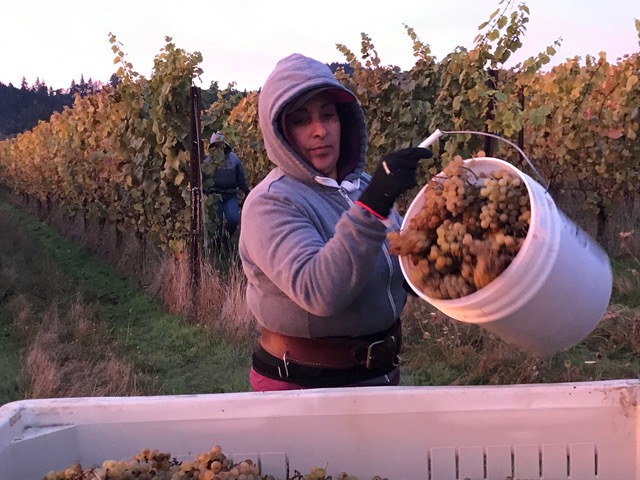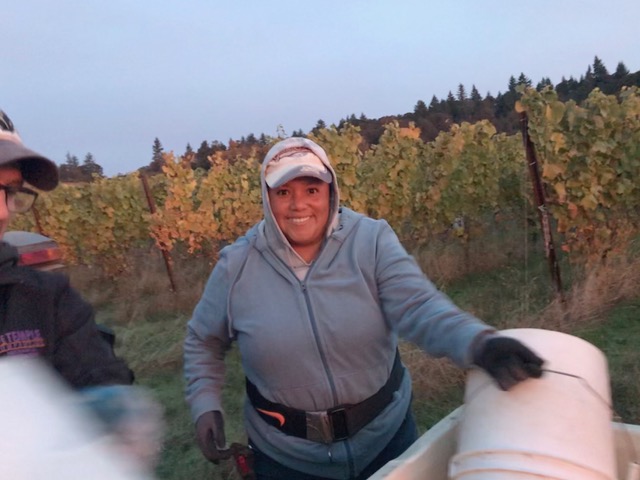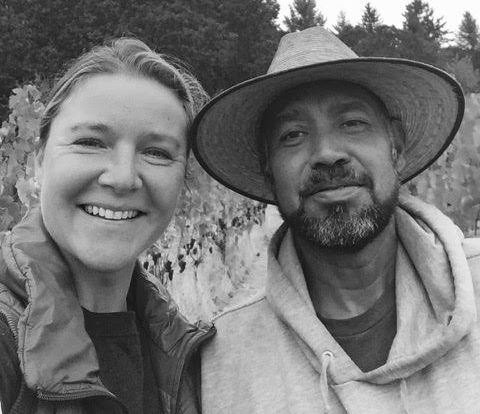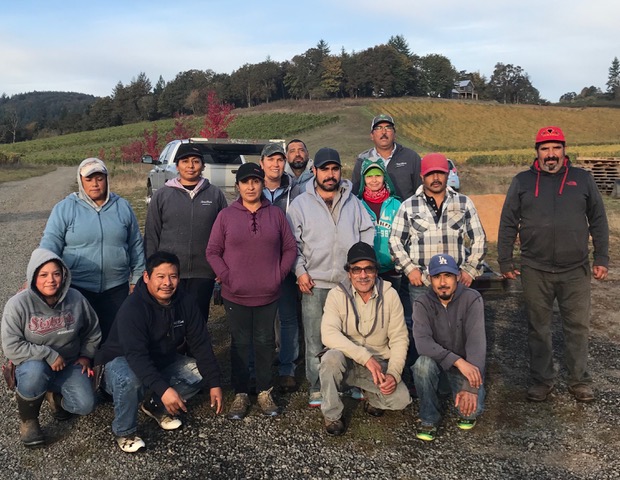Who’s Really Trampling out the Vintage?
Una nota de gracias
About a year back, when I was still working with my dear friends at Lingua Franca, I found myself navigating the darkest hour between their night harvest and my dawn harvest at Hope Well. Not enough time to go home and get a nap, too tired to try to even bother getting warm. I was sitting in my car drinking coffee from a thermos in the 7-11 parking lot, as I did not want to wake my family by going home. Some of the people from the night pick were mulling about the parking lot, eating the only warm, cheap food that can be had at that hour of the night / morning. Why on Earth wouldn’t they be already home in their beds, you ask?

Because of course they were all going on to other jobs. Maybe their day job, maybe another pick in the daytime. We were all cold, sweaty, dirty and tired. I looked over to the car next to me and saw a woman sleeping with two little babies on her chest. Her hair indicated she was the abuelita, and the babies slept soundly, but she was clearly stirring. I watched her transition the babies to their mother, who had finished her snack and was taking her place in the car with the children while abuelita put on her gear and boarded the van to go with the pickers to the next job.
I watched them go as I tried to thaw my fingers on my thermos. I thought of abuelita and the three generations of her family working on farms across the valley. Mama was strapping her babies into their carseats and looking so tired that I tapped on her window and offered to follow her home. We delivered her babies to their older siblings. Mama quickly changed into the clothes she would wear while she cleaned houses the rest of the day.

As dawn drew close I asked her to be careful that day, please sleep soon, please thank her family for the beautiful work they were doing, and left to meet my crew at Hope Well. It was an incredibly emotional drive, which helped keep me awake, but I still struggle to convey what was burning in my chest.
At the gates of Hope Well I was greeted by the shouts and smiles of my well-rested compadres.This group of remarkable people I’ve known for so long, the crew that has worked with my family through the decades, also works with me at Hope Well. The work I am able to do because they belong here means everything to the mission of this place.
Since I was a child, I have watched the same group of men and women work the vines, first at Bethel Heights, and now here as well, and how differently they work than any of the very talented crews of contract labor I have had the opportunity to work with in other vineyards.
The way I work is, to put it lightly, different. I am asking these people to take a journey with me and this place. To take that walk I cannot just ask them to go out and do a particular job. I need them to understand the reason everything looks so different here. I need them to understand that our work is always toward the goal of repairing a relationship with this land. I need them to see how everything fits together.
There is real levity in the vines here. We do serious work with great joy in our hearts. As I crossed the gate that morning, into the arms of my crew, I’ve never felt more grateful for the system that my family has fought to maintain, even as the world turns away from any permanent labor model, outsourcing every job that can be systematized, placing the responsibility and liability on someone else’s business. Bethel Heights formed an alliance with Temperance Hill more than twenty years ago to provide full-time work, benefits, and proper working conditions.
I bring this up, because that parking lot at the 7-11 was full of the very same talent and skill that was waiting for me back at Hope Well. They are all a part of an unstable economy, built on their backs, that won’t take responsibility for the most important component of the work we do; The human component.
We have marginalized the most important work being done in this country. We have painted labor in terms of drudgery, mindless, unskilled tasks that anyone with education or talent would be a fool to tarry with. I would be the last person to point the finger at labor contractors or even the businesses that hire them for starting this epidemic. At the heart of this is the systemic death of a type of working landscape that understands how beholden we are to that work, and how our society is failing as that uniting force is vilified, alienated, and persecuted.
To work the land in the growing of food and fiber for your country is, I submit, the very highest calling. To put your body and your mind to bringing the harvest to the first responders, the soldiers, the doctors and the lawyers, lauded all, cannot the people who feed and clothe them be justly honored? To be very clear, the work we do, the synergy between bodies moving through space, the way the naked and healthy environment inspires a free mind to think about the work of the hand, the tool, the effort, there is no cubicle or desk that offers the same promise.
The people in that early-morning parking lot, the people behind my gate, the people who have picked me up when I have fallen, and suffered every loss with me as viscerally as I, WE ARE YOU. We are building your children’s future. Those hands that we classify as ‘unskilled’ and the direction of their work could change the fate of our world. Can we please stand up and give the greatest thanks of this season to the backs that brought that bounty to your table? Right now, they are cutting and wrapping your Christmas tree.

They are WE. The contracted laborer has all the promise of José Luís on my crew, if given the chance and the confidence to BELONG to this place. Our land turns on their affection. Our futures are their futures.
A mi gente: José Luís, Victor, Chapo, Tito, Joaquín, Blanca, Catalína, Asunción, Jesús, Nicolasa, Francisco, Maria, Isabel, Cente, gracias muchísimas por todo, cada día, cada año. Y a todas las familias trabajando en las granjas, ranchos, escuelas, casas, hospitales, ustedes tienen mi
gratitud tambien.
